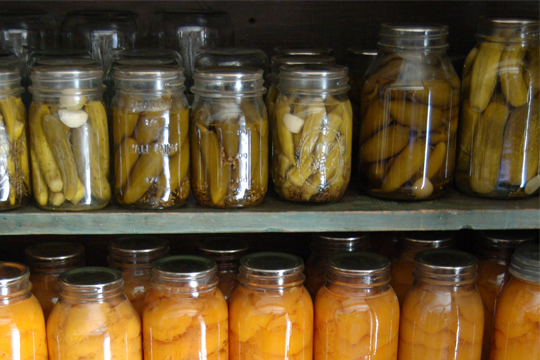
Reducing Food Waste in Foodservice
October 16, 2018 by Doreen Garelick, Dietetic Intern
Our intern Doreen attended a food waste summit for restaurants and compiled these tips to help food service operators redirect…
SPE Certified's Perfect Pantry
February 28, 2013

Senior Culinary Nutritionist Andrea Canada begins a series of posts about what to keep in your kitchen to help you avoid processed foods. Today's post: Stock.
Heavily processed foods have been making headlines recently. Just last week, The New York Times Magazine published a piece describing the highly scientific process in which food companies develop products to achieve a taste “bliss point” and engineer foods that pack a taste punch that leave someone wanting more.
In general, heavily processed foods contain high amounts of refined grains, sugars, sodium and less healthy fats. With all the processing, many of the beneficial nutrients needed for a healthy diet are destroyed or removed, and may or may not have been added back as supplements. Finally, colors, flavors, and preservatives are added to maintain the product’s shelf-life.
As a dietitian, I want to encourage people to consume more minimally-processed foods. However, I understand it can be a challenge to forgo the perceived convenience of processed foods. A properly stocked kitchen and pantry is a good start to have healthy foods and ingredients readily available. As winter begins to wane, it’s the perfect time to take a look in the pantry and do a little pre-spring cleaning, removing the most heavily-processed items and stocking the kitchen for health. Over the next few weeks, we will be using this blog space to help you identify what ingredients and equipment are the staple of every well-stocked kitchen -- and what needs to go.
To get things started, check out this post about making your own stocks. Cooking with chicken, seafood, beef or vegetable stock is a great way to give foods a greater depth of flavor. Commercial stocks available in the grocery store can be high in sodium and are typically expensive, so it’s advisable to look for low-sodium varieties or make your own. Making fresh stock allows you to control the sodium and added ingredients, and it can be made in bulk before being frozen for up to 3 months.
What essential items do you keep in your kitchen/pantry? Let us know in the comments below!

October 16, 2018 by Doreen Garelick, Dietetic Intern
Our intern Doreen attended a food waste summit for restaurants and compiled these tips to help food service operators redirect food waste from landfills.
Nutrition 101

Nutrition 101
September 26, 2018 by Doreen Garelick, Dietetic Intern
Ever notice headlines about rapid weightloss? Dietetic Intern Doreen Garelick looks deeper into a recent eye-catching headline to see if there's any truth behind it.
Connect
 Follow us on Twitter
Follow us on Twitter Friend us on Facebook
Friend us on Facebook Follow us on Pinterest
Follow us on Pinterest Follow us on Instagram
Follow us on Instagram Read our Blog
Read our Blog Watch videos on YouTube
Watch videos on YouTube Watch videos on Vimeo
Watch videos on Vimeo Connect with us on Linkedin
Connect with us on Linkedin Find us on Foursquare
Find us on Foursquare
Tweets by @SPEcertifiedBlog Search
Categories
SPE Certified Newsletter
Sign up for news on the latest SPE-certified venues, events and SPE updates.
We will never share your personal information with a third party.